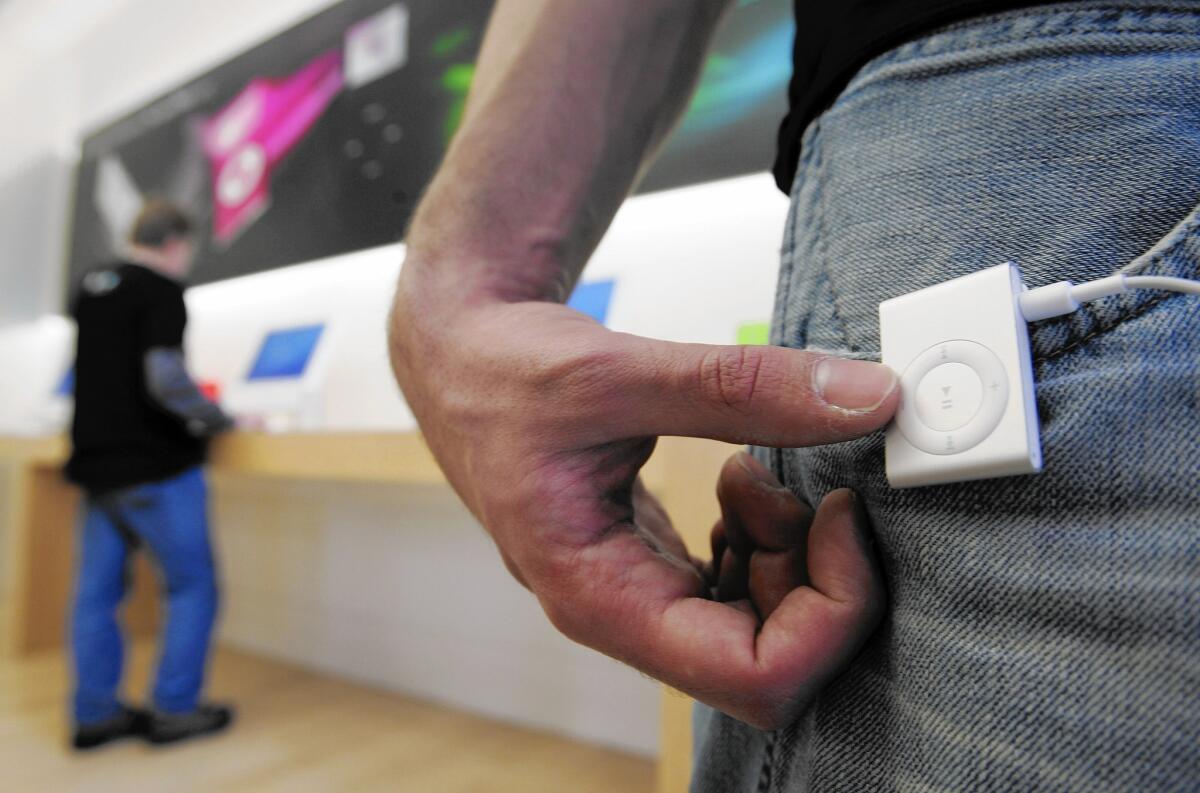Apple wins iPod antitrust case, dodges potential $1-billion liability

A federal jury sided with Apple Inc. on Tuesday, ruling that the tech giant did not violate antitrust laws when it blocked music downloaded from rivals from playing on iPods. The unanimous decision ended a decade-long class-action suit that could have cost Apple as much as $1 billion.
The lawsuit claimed that Apple violated state and federal law by issuing a software update in 2006 for its iPod music player that prevented the devices from playing songs not purchased on iTunes. That update, the suit alleged, locked customers into the Apple ecosystem, which in turn allowed the company to drive up prices for future iPod devices, causing them to be higher than they otherwise would have been.
During the two-week trial in U.S. District Court in Oakland, Apple’s lawyers argued that the software update improved its products, was good for consumers and had no effect on iPod prices.
After about three hours of deliberation, the eight jurors unanimously found that Apple’s iTunes 7.0 update was a “genuine product improvement,” which cleared the company of the antitrust allegations.
“We thank the jury for their service and we applaud their verdict,” Apple spokeswoman Kristin Huguet said.
Patrick Coughlin, a lawyer for the plaintiffs, said he was disappointed and planned to appeal.
“I think the jury had a really tough decision,” he said. “We at least got the case to a jury and we hoped for a different result, but you have to always respect the jury process.”
Among the allegations, the class-action suit claimed that from 2006 to 2009, Apple’s software would delete songs purchased from other music download programs.
At issue were iPods owned by about 8 million customers.
Tuesday’s verdict marks the end of a protracted series of legal challenges involving the iPod’s inability to play music downloaded from somewhere other than iTunes. A suit was filed in 2005 claiming that such lack of interoperability violated antitrust laws, but those claims were dismissed in federal court in 2012.
The only surviving claim, which was effectively mooted by Tuesday’s verdict, alleged that the 2006 iTunes update illegally shut out RealNetworks Inc. from the MP3 market. The consumer plaintiffs contended that the update specifically blocked files downloaded through RealNetworks, giving Apple a monopoly on the MP3 market by way of the iPod.
In court filings, the plaintiffs argued Apple’s dominance of the market resulted in consumers being overcharged by more than $351 million, a figure that could have tripled with antitrust penalties had the jury ruled against Apple.
The trial, which included a video deposition of a frail Steve Jobs months before his 2011 death, was rocked by a series of bizarre events.
The case went to trial with two plaintiffs chosen to represent the class, but both were disqualified after Apple found that neither had bought iPods during the period outlined in the suit. The Cupertino, Calif., tech company then filed a motion seeking to have the class-action lawsuit dismissed, but the judge allowed it to move forward.
At one point, Judge Yvonne Gonzalez Rogers threw out the last remaining plaintiff and then ordered the plaintiffs’ attorneys to find new ones, which Coughlin conceded was “a very odd situation to occur in mid-trial” and led to a time-consuming process to interview and prep new plaintiffs.
“I don’t know if it affected the outcome,” he said. “It certainly affected us.”
Although Apple can move on from the iPod case — at least for now — it’s defending against a separate long-standing antitrust battle involving e-books.
In a case filed by the U.S. Justice Department, a federal judge ruled in 2013 that Apple had colluded with five major publishers to fix e-book prices. Apple and the publishers had moved e-book sales from a wholesale-retail model, in which retailers paid a flat rate to publishers and then set their own end prices, to an “agency model,” in which Apple took a percentage of an agreed-upon sales price.
The move was widely seen as a strategy to compete against e-books juggernaut Amazon.com, which was selling e-books for $9.99 each. The publishers contended those prices hurt their sales of print books.
This summer, the judge in the e-book case gave preliminary approval to a proposed $450-million settlement; Apple is appealing. Terms of the settlement include reduced or no payments if Apple wins its appeal; a decision is not expected for some time.
Twitter:@byandreachang
Times staff writer James Queally contributed to this report.







